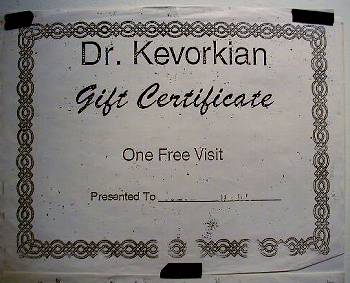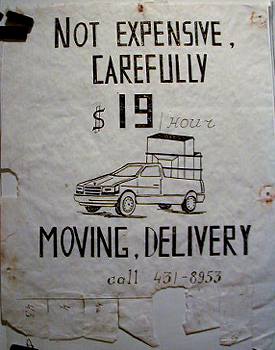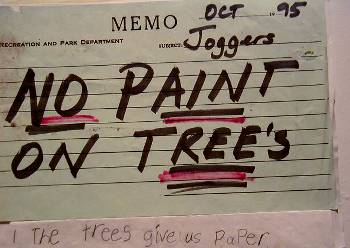|
|
|
|
|
|
|
|
|
|
|
|
|
 |
|
|
|
|
|
|
|
Around a decade ago, San Francisco
artist Chris Sullivan started collecting mattresses. Not just any mattresses,
but used, discarded ones. "They're just right there, out on the street," explains
Sullivan, who says he couldn't resist them. He would drive around the city,
spot the mattresses, stop, pick them up and throw them in the back of his
pick-up truck. From there, he would take them to a photo studio and shoot
them with his 35mm camera. "I would skin the ticking off of them," he says
with a grin. "It kind of looked like Jack the Ripper had been there."
Collecting mattresses was no easy
task. First off, they were large, awkward to carry and difficult to store.
And after awhile, they became too raw and exposed, even for Sullivan, whose
interests lie in the intersection of the public and private domain. "Discarded
mattresses are really played out: the disconsolate postures, the stains, mixed
with the floral patterns," he says. "They represent whole lives played out
right there in front of you."
|
|
|
|
 |
|
|
|
|
These
days, Sullivan, 42, and a self-described language photographer, collects items
of a more manageable scope than mattresses: scraps of paper, signs, handwritten
notes, all of which he, or others, find on the street, and he determines to
be part of the public domain. It is a collection so vast that Sullivan has already
published 180 copies of Volume I of the "JPD" (Journal of Public Domain). By
June, he expects to have another 1,500 copies published. The JPD, in piecemeal
form, has been exhibited at a number of Bay Area galleries, including the Magnet
Gallery at Rayko South Photo Center. Sullivan's day job is managing Rayko South,
which is located in San Francisco's South of Market neighborhood and offers
dark-room rentals and photography classes to Bay Area photographers. "You can't
really make a living off the Public Domain," explains Sullivan, who has been
charging $10 for copies of Volume I. |
|
|
|
|
|
|
|
|
|
|
|
 |
|
|
|
A
lot of Sullivan's findings are from his own backyard in San Francisco, to which
he migrated from his hometown of Bakersfield. "Moving from a smaller place,
I was struck by the intimacy that results from living among a million people,"
he says. On the streets of San Francisco, he finds intimate personal effects,
like the used mattresses, "laid out for everyone to see." Other work Sullivan
has created includes "The Affable Man," a series of self-portraits in which
he dressed up as a grinning real estate salesman, and the "Shrubman" series,
which featured a potted plant with arms, legs and a wardrobe. Sullivan photographed
it in both indoor and outdoor scenes. |
|
|
|
|
|
|
|
|
|
|
Some
items in the JPD are from as far away as Potsdam, N.Y., where Sullivan has friends.
Thanks to word of mouth, Sullivan has an informal network of about 50 friends
and strangers who mail to him items they find on the street, thrown off of windshields,
on signposts and in the gutter. Each item is put into a category: blocked driveway
windshield notes, first persons, general interest, get rich, home, lists, work,
love, religion, reward, science and medicine, the wheel. Sullivan describes
them as the basic themes of life. "Things become a lot more meaningful when
you categorize them," he says. "Otherwise, it's all just stuff." |
|
|
|
|
 |
|
|
|
|
|
|
One
of Sullivan's informal rules is that he doesn't lay claim to an item while it's
still "in use." If a car is blocking a driveway and it has a note on it, Sullivan
will leave the note there. After it has been crumpled up, discarded, thrown
on the curb or in the gutter, he'll take it and put it in its rightful category
in the JPD. |
|
|
|
|
|
|
|
|
|
 |
|
|
 |
|
|
|
"The circumstances and the condition
tell a lot of the story," says Sullivan, pointing to one of his favorite pieces,
a black-and-white, hand-drawn sign for a mover (above, right), which he found
one day in San Francisco's Outer Richmond district. "You really would want
this guy carrying your 300-pound heirlooms up the stairs," he says. The sign
is meticulously drawn, each letter of each word the same size and angle as
the next. In the middle is a simple pencil drawing of a pick-up truck, boxes
strapped in the back of it, and a phone number below it. The sign is printed
in two versions: one in English, the other Russian. It reads, "Not expensive,
carefully."
"Listen to that," says Sullivan.
"It's got the delicacy of Haiku."
|
|
|
|
|
|
|
|
|
|
|
|
|
|
To
contact Chris Sullivan and the JPD, write JPD c/o Rayko South, 984 Folsom St.,
San Francisco, CA 94107 |
|
|
|





